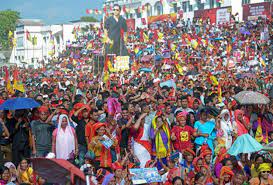Most NE parties come together across political lines to oppose the Uniform Civil Code
In the northeastern area, where members of the Hindu, Christian, and Muslim populations are represented in respectable numbers, most non-BJP parties, including the saffron party’s allies, reject the Uniform Civil Code (UCC).
Similar to the CAA, the UCC is fiercely opposed by the Mizoram National Front (MNF), the Congress, and minor parties like the Zoram Peoples Movement (ZPM), Mizoram People’s Conference (MPC), and other non-political groups.
Before the Covid-19 epidemic began in 2020, anti-CAA demonstrations had first begun in Assam, some of West Bengal, and other northeastern regions in 2019. They had lasted until 2020.
At least five people were murdered during the anti-CAA rallies in Assam, which also saw widespread violence and a curfew imposed for many days.
Various northeastern states are still seeing intermittent CAA protests.
Mizoram, Meghalaya, and Nagaland, three states with a predominance of the Christian religion and tribalism, have all voiced strong resistance to the intended adoption of the UCC.
Strongly rejecting the proposed bill, the Mizoram Pradesh Congress Committee (MPCC) emphasised the need for a coordinated opposition. Ronald Sapa Tlau, a senior member of the Congress party and a former Rajya Sabha member, said that state party president Lalsawta would send a petition to the Law Commission of India opposing to the UCC.
In order to save India’s culture and religion, Tlau said, “The Congress party invites people of all sections in Mizoram to join hands in opposition to the UCC and the BJP.”
In response to the MNF’s claim that the Mizoram people would be protected by article 371G of the Indian Constitution, he remarked that the BJP administration at the centre cannot be trusted.
The Congress leader said that everyone in the state should resist the proposal to enact the proposed UCC in order to defend and preserve our cultural and religious identity.
According to the former legislator, the UCC’s adoption would lead to the subjugation of minorities and minority religious groups and possibly their integration by the majority community, which would be harmful to the integrity and unity of the nation.
The Mizoram Synod of the Presbyterian Church of India and the state’s dominant churches, the Mizoram Kohhran Hruaitute Committee (MKHC), have already expressed their objection to the UCC’s implementation to the Law Commission of India.
On February 14 of this year, the Mizoram Assembly approved a motion condemning the UCC that was put out by Home Minister Lalchamliana.
“That this House unanimously resolved to oppose any steps taken or proposed to be taken for the enactment of UCC in India,” the resolution had said.
In a letter to the Law Commission dated July 4, Mizoram Chief Minister Zoramthanga, who is also the president of the governing MNF, claimed that his party had thought that the adoption of UCC is not in the best interests of the Mizos in particular or the ethnic minorities of India as a whole.
If the UCC were to become law, it “would disintegrate the country as it was an attempt to terminate the religious or social practises, customary laws, culture, and traditions of the religious minorities, including the Mizos.”
In his letter, Zoramthanga claimed that on June 30, 1986, the MNF Party signed a Memorandum of Settlement with the Government of India, on the basis of which the Union Parliament approved the Constitution (53rd Amendment) Act, 1986.
The MNF supremo stated in his letter that “now, as provided under Article 371-G of the Constitution of India, made on the basis of the said Memorandum of Settlement, it has been provided there that – “no Act of Parliament in respect of Religious or Social practises of the Mizos, Mizo customary law and procedure, shall apply to the state of Mizoram unless the legislative Assembly of the state of Mizoram by a resolution so decides.
According to him, the MNF is a part of the North East Democratic Alliance (NEDA) and supports the policies and initiatives of the NDA government at the national level, provided that they are deemed to be advantageous for the general public and, in particular, for India’s ethnic minorities.
The MNF, however, believes that the UCC’s implementation is not in the best interests of India’s ethnic minorities in general, or the Mizos in particular.
He said that the NDA government’s plan cannot be adopted since the intended implementation of the UCC conflicts with the Mizos’ social and religious practises as well as their customary/personal law, all of which are particularly protected by the Constitution.
As a result, the MNF respectfully objects to the UCC’s planned proposal.
The Mizoram branch of the BJP also rejected the UCC.
The UCC should never be adopted in the northeastern states, according to state BJP president Vanlalhmuaka, in order to preserve the area’s multireligious nature.
Analysts claim that the CAA is the first piece of law to grant citizenship based on religion, sparking strong opposition throughout the nation, particularly in the northeast.
The CAA aims to provide Indian citizenship to non-Muslim minorities, including Hindus, Sikhs, Buddhists, Jains, Parsis, and Christians, who have fled persecution in their home countries of Bangladesh, Pakistan, and Afghanistan as of December 31, 2014.
Both Houses of Parliament approved it, and the President signed it in December 2019. However, the CAA’s guidelines have yet to be developed.







